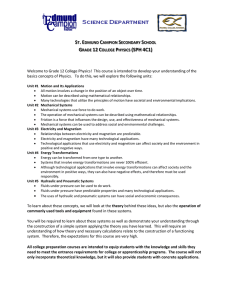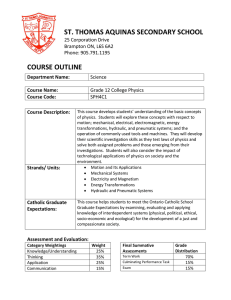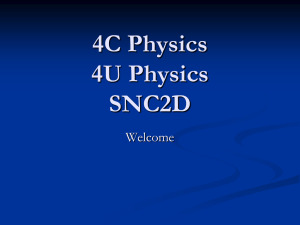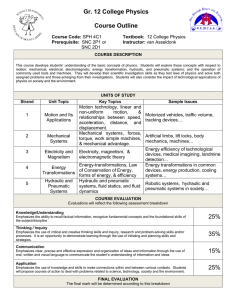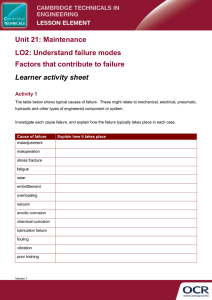SPH 4C1 Course Outline
advertisement
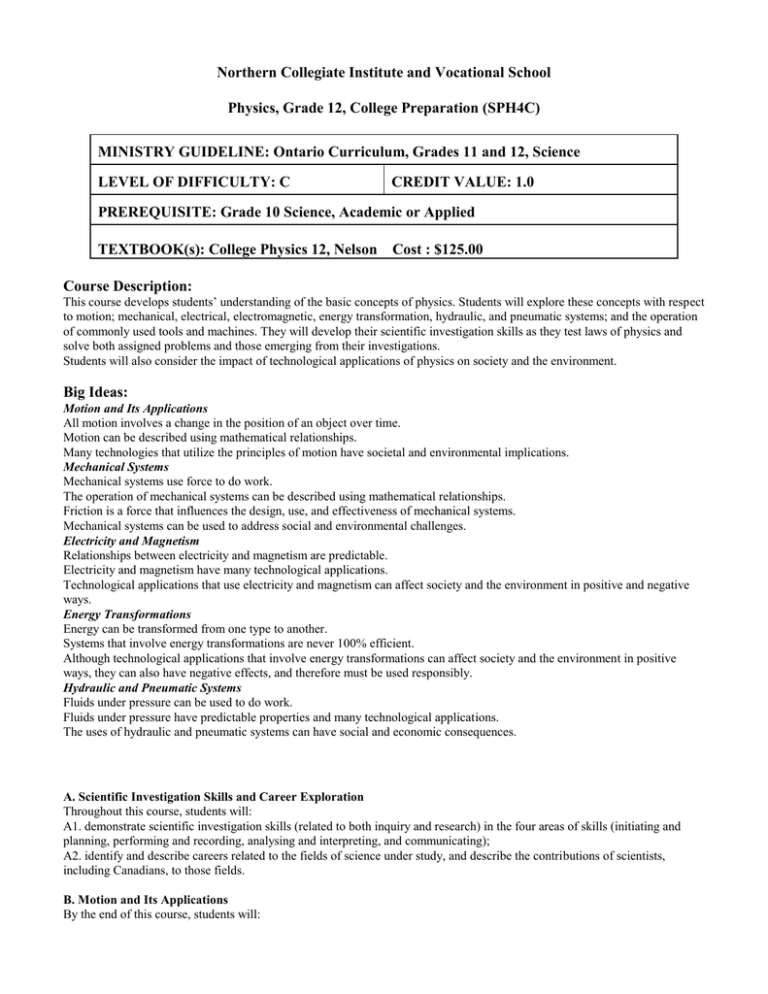
Northern Collegiate Institute and Vocational School Physics, Grade 12, College Preparation (SPH4C) MINISTRY GUIDELINE: Ontario Curriculum, Grades 11 and 12, Science LEVEL OF DIFFICULTY: C CREDIT VALUE: 1.0 PREREQUISITE: Grade 10 Science, Academic or Applied TEXTBOOK(s): College Physics 12, Nelson Cost : $125.00 Course Description: This course develops students’ understanding of the basic concepts of physics. Students will explore these concepts with respect to motion; mechanical, electrical, electromagnetic, energy transformation, hydraulic, and pneumatic systems; and the operation of commonly used tools and machines. They will develop their scientific investigation skills as they test laws of physics and solve both assigned problems and those emerging from their investigations. Students will also consider the impact of technological applications of physics on society and the environment. Big Ideas: Motion and Its Applications All motion involves a change in the position of an object over time. Motion can be described using mathematical relationships. Many technologies that utilize the principles of motion have societal and environmental implications. Mechanical Systems Mechanical systems use force to do work. The operation of mechanical systems can be described using mathematical relationships. Friction is a force that influences the design, use, and effectiveness of mechanical systems. Mechanical systems can be used to address social and environmental challenges. Electricity and Magnetism Relationships between electricity and magnetism are predictable. Electricity and magnetism have many technological applications. Technological applications that use electricity and magnetism can affect society and the environment in positive and negative ways. Energy Transformations Energy can be transformed from one type to another. Systems that involve energy transformations are never 100% efficient. Although technological applications that involve energy transformations can affect society and the environment in positive ways, they can also have negative effects, and therefore must be used responsibly. Hydraulic and Pneumatic Systems Fluids under pressure can be used to do work. Fluids under pressure have predictable properties and many technological applications. The uses of hydraulic and pneumatic systems can have social and economic consequences. A. Scientific Investigation Skills and Career Exploration Throughout this course, students will: A1. demonstrate scientific investigation skills (related to both inquiry and research) in the four areas of skills (initiating and planning, performing and recording, analysing and interpreting, and communicating); A2. identify and describe careers related to the fields of science under study, and describe the contributions of scientists, including Canadians, to those fields. B. Motion and Its Applications By the end of this course, students will: B1. analyse selected technologies that are used to move objects or track their motion, and evaluate their impact on society and the environment, including their contribution to scientific knowledge; B2. investigate, in qualitative and quantitative terms, the linear uniform and non-uniform motion of objects, and solve related problems; B3. demonstrate an understanding of different kinds of motion and the relationships between speed, acceleration, displacement, and distance. C. Mechanical Systems By the end of this course, students will: C1. analyse common mechanical systems that use friction and applied forces, and evaluate their effectiveness in meeting social or environmental challenges; C2. investigate forces, torque, work, coefficients of friction, simple machines, and mechanical advantage, and interpret related data; C3. demonstrate an understanding of concepts related to forces and mechanical advantage in relation to mechanical systems. D. Electricity and Magnetism By the end of this course, students will: D1. analyse the development of selected electrical and electromagnetic technologies, and evaluate their impact on society and the environment; D2. investigate real and simulated mixed direct current circuits and the nature of magnetism and electromagnetism, and analyse related data; D3. demonstrate an understanding of the basic principles of electricity and magnetism. E. Energy Transformations By the end of this course, students will: E1. evaluate the impact on society and the environment of energy-transformation technologies, and propose ways to improve the sustainability of one such technology; E2. investigate energy transformations and the law of conservation of energy, and solve related problems; E3. demonstrate an understanding of diverse forms of energy, energy transformations, and efficiency. F. Hydraulic and Pneumatic Systems By the end of this course, students will: F1. analyse the development of technological applications related to hydraulic and pneumatic systems, and assess some of the social and environmental effects of these systems; F2. investigate fluid statics, fluid dynamics, and simple hydraulic and pneumatic systems; F3. demonstrate an understanding of the scientific principles related to fluid statics, fluid dynamics, and hydraulic and pneumatic systems. Evaluation: Term Work 70% Knowledge / Understanding 35% Inquiry / Thinking 30% Communication 15% Application / Making Connections 20% (Summative assessment activities during the course will be comprised of a variety of methods and strategies eg. Assignments, projects, tests, performances, conferences, etc.) Final Evaluation 30% (The final evaluation activity may consist of one or more activities and may include a variety of assessment strategies eg. Report, essay, examination, interview, performance, presentation, portfolio). Students are expected to submit all assignments within the time frame specified by the teacher. Teachers will consider extenuating circumstances when assignments are late. If an assignment is late, 10% may be deducted per school day, up to a maximum of 50%. Once assignments have been returned to students, any late submissions may receive a mark of zero. I have read and understand the course expectations and evaluation policies outlined above. _________________________________ Student Signature _________________________________ _________________________________ Parent Signature _________________________________ Date Date
